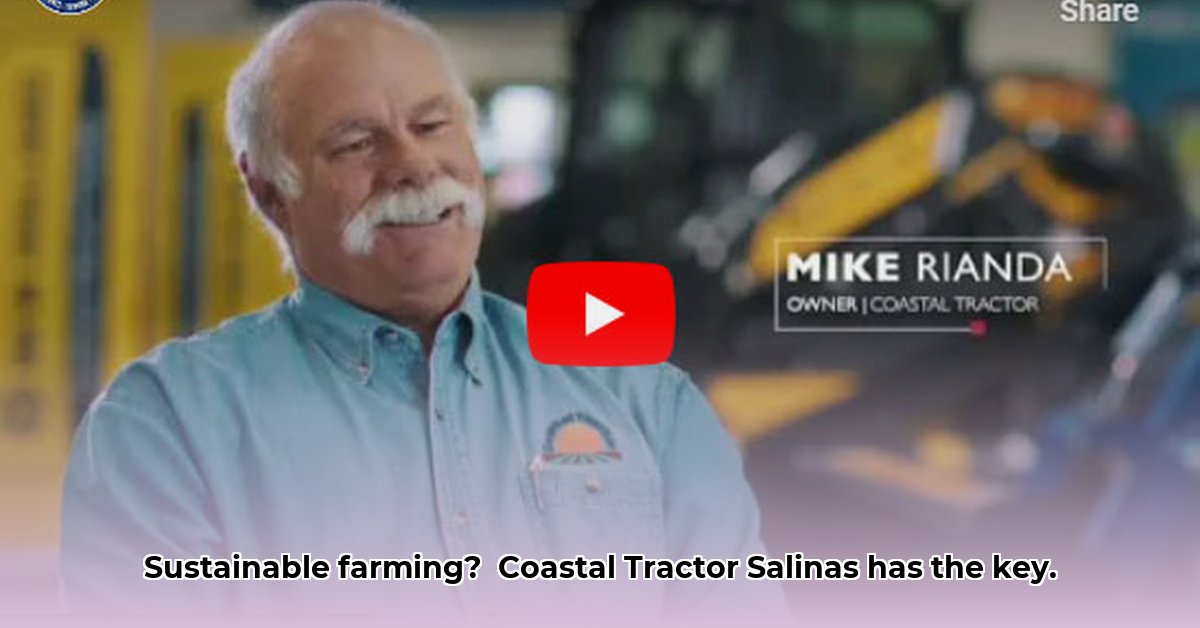
The Salinas Valley, a cornerstone of California agriculture, faces increasing pressure to adopt sustainable farming practices. Coastal Tractor Salinas, a significant New Holland dealership, plays a vital role in equipping local farmers. However, the extent of its contribution to sustainable agriculture remains unclear. This preliminary assessment explores Coastal Tractor Salinas's current offerings and identifies critical data gaps that require further investigation. For smaller farms, consider compact tractor options.
Assessing Coastal Tractor Salinas's Role in Sustainable Agriculture
Coastal Tractor Salinas provides New Holland tractors, harvesting equipment, and related services. This suggests a key role in maintaining the Valley's agricultural productivity. However, based on available information, several vital questions remain unanswered. For instance, what specific New Holland models emphasizing fuel efficiency and low environmental impact are stocked? Does Coastal Tractor offer alternative brands known for their sustainable features? What support mechanisms are in place to assist farmers transitioning to more water-wise practices? The absence of this information prevents a definitive assessment of their commitment to sustainable agriculture.
The Salinas Valley's unique challenges—water scarcity, soil health preservation, and the need for cost-effective solutions—demand careful consideration. Currently, data is insufficient to fully evaluate how Coastal Tractor addresses these specific concerns. Further research is needed to understand their financing options for farmers upgrading to more efficient equipment, as well as the availability and types of used equipment offered. This information is essential for assessing accessibility to sustainable solutions for farmers with diverse economic situations.
Addressing Data Gaps: Recommendations for Further Research
To comprehensively understand Coastal Tractor Salinas’s contribution to sustainable agriculture, several key steps are recommended:
Short-Term Actions (Within One Year)
Comprehensive Equipment Inventory: Coastal Tractor Salinas should publicly release a detailed inventory of its equipment, highlighting features supportive of sustainability (fuel efficiency, precision farming capabilities, etc.). This data should be openly accessible to farmers and researchers.
Direct Farmer Feedback: A comprehensive survey of Salinas Valley farmers is crucial to gauge their experiences with Coastal Tractor Salinas's equipment and services, focusing on both satisfaction and sustainability-related aspects.
Government and Industry Collaboration: A collaborative effort involving Coastal Tractor Salinas, local government agencies, and agricultural researchers is needed to assess the effectiveness of existing sustainability initiatives and identify areas needing improvement. This could involve joint workshops, educational programs, funding opportunities, and incentives for sustainable equipment adoption.
Comparative Market Analysis: A thorough comparison of Coastal Tractor Salinas’s offerings against other agricultural equipment dealers in the region is crucial to understand competitiveness and market trends related to sustainable technologies.
Long-Term Strategies (3-5 Years)
Expanding Sustainable Equipment Options: Coastal Tractor Salinas should explore partnerships with manufacturers known for their commitment to sustainability, expanding their offerings beyond New Holland to provide a broader range of environmentally responsible equipment choices.
Incentivizing Sustainable Practices: Collaborative projects involving Coastal Tractor Salinas, farmers, and government bodies may explore long-term incentive programs to encourage adopting sustainable technologies. This could include financial aid, tax breaks, or carbon offset programs.
Infrastructure Development: The collaborative efforts mentioned above should address the necessary infrastructural developments to support sustainable farming equipment, such as charging stations for electric vehicles, improved waste management systems, and advanced water management infrastructure.
Investment in Research and Development: Collaboration with local agricultural research institutions to study the performance of sustainable technologies in the unique Salinas Valley environment is needed. This will ensure that the most effective and appropriate technologies are readily accessible to farmers.
Key Findings and Next Steps
Currently, a comprehensive picture of Coastal Tractor Salinas’s role in promoting sustainable agriculture in the Salinas Valley remains elusive. Limited data prevents us from drawing definitive conclusions about their contributions. To achieve a complete understanding, further investigation is essential, including comparative analysis of competitors, direct farmer input via surveys and interviews, and environmental impact assessments of the equipment Coastal Tractor Salinas offers. This ongoing research is vital to assessing their overall impact on sustainable farming practices within the Salinas Valley.
Sustainable Farming Equipment Financing in Salinas Valley: A Preliminary Look
Access to financing is a significant challenge for farmers seeking sustainable agricultural equipment. This section explores potential financing avenues in the Salinas Valley, acknowledging existing data limitations.
Challenges and Opportunities for Sustainable Equipment Financing
The high upfront costs associated with sustainable agricultural equipment represent a key barrier for numerous farmers. While traditional bank loans, government grants and programs, equipment leasing, and partnerships with agricultural equipment suppliers offer potential routes to financing, the details of specific programs, eligibility requirements, and accessibility to smaller farms in the Salinas Valley remain largely unexplored. Further research is needed to fully understand the financing landscape.
Recommendations for Securing Funding
Farmers seeking financing for sustainable equipment should:
Thoroughly investigate local and federal funding opportunities: Several government agencies offer grants and loans for sustainable agriculture investments.
Engage with agricultural lenders: Communicate your commitment to sustainable practices, emphasizing both economic and environmental benefits to lenders.
Consider equipment leasing: Leasing can alleviate upfront costs and make sustainable equipment more accessible.
Network with other farmers and agricultural organizations: This can reveal invaluable insights and uncover potential funding opportunities.
Develop a detailed business plan: A well-defined business plan, highlighting the economic and environmental benefits of your sustainable practices, is crucial for securing funding from all sources.
This analysis underscores the need for further investigation into available financing options for sustainable agricultural equipment in the Salinas Valley. Only with more comprehensive data can we fully understand the challenges farmers face and support the transition to sustainable farming practices.